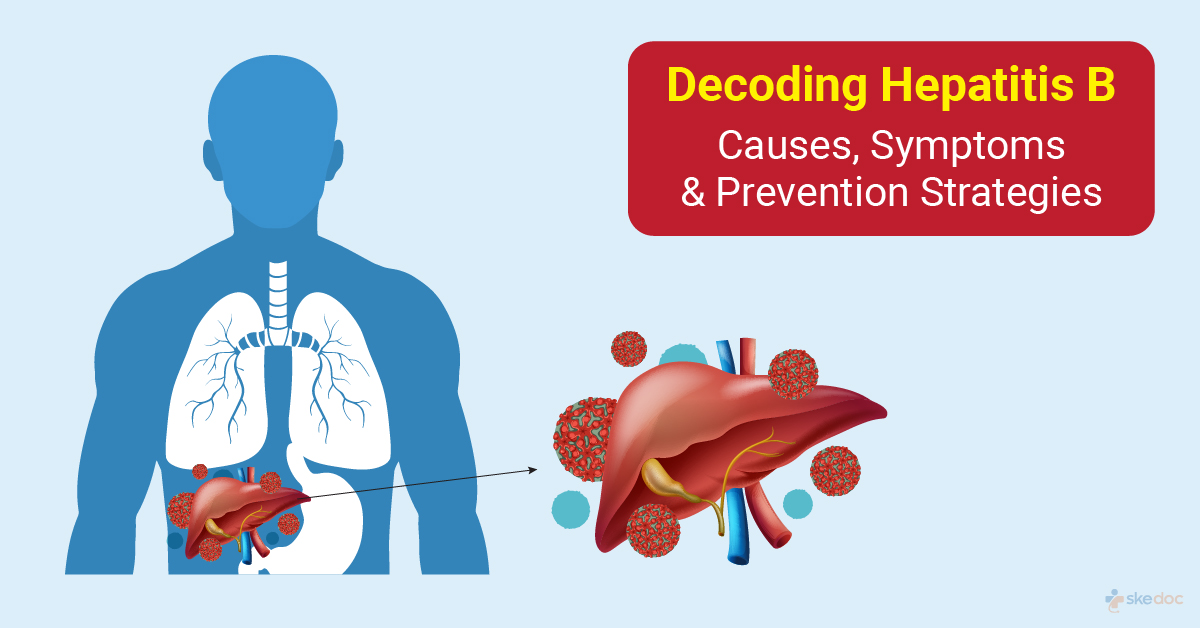Allergy
Blood Diseases
Bone & Joints
Brain
Cancer
Child Care
Cosmetic Surgery
Diabetes
Endocrinology
ENT
Eye
Gen Medicine
General Surgery
Heart
Kidney
Lifestyle
Liver & Digestive
Lung
Men’s Health
Mental health
Physiotherapy
Rheumatology
Skin and hair
Sleep Disorders
Spine
Transplant
Women Health
Thyroid
Vascular Surgery
Hepatitis B

What is Hepatitis B?
Hepatitis B is a severe liver infection caused by the hepadnavirus called the Hepatitis B virus. It is transmitted through body fluids and infected blood. The infection may be acute and resolve quickly or chronic and persist for more than 6 months.
Is hepatitis B a medical emergency?
Hepatitis B should receive medical attention at the earliest, as it can prevent the infection from becoming severe.
Types
- Acute: Lasts for less than 6 months
- Chronic: Lasts for more than 6 months
Causes
It is a highly infectious disease (50 - 100 times more than HIV) that can spread through infected blood and body fluids. The virus is present in the blood, saliva, semen, and vaginal fluids. The following modes of transmission are possible for a Hepatitis B virus infection:
- Sexual contact: Unprotected sex with an infected person
- Re-use and sharing of contaminated needles and syringes
- Needlestick injuries: Accidental infection in healthcare workers
- Vertical transmission from an infected mother to a child
Risk factors for hepatitis B
The risk factors include the following:
- Having unprotected sex and having multiple sex partners
- Sharing of needles and syringes for IV drug use (recreational drugs or otherwise)
- Homosexual or bisexual men
- Living with someone who has a chronic infection
- Being born to a mother infected with Hepatitis B infection
- Traveling to areas with a higher incidence of Hepatitis B
Signs & symptoms
The symptoms and signs of this virus infection include:
- The general feeling of being unwell and loss of appetite
- Nausea and vomiting
- Body aches
- Fever
- Dark urine
- Abdominal pain
- Itching of the skin
- Jaundice: Yellowing of the skin and whites of the eyes
- Skin rash (only in some cases)
This virus infection may cause the following symptoms:
- Confusion
- Excessive sleepiness and disturbances in sleep patterns
- Swelling of the abdomen (ascites)
- Black stool or blood in the stool
- Coma
Investigations
The following investigations may be done for this virus infection:
- Laboratory test
- Routine blood tests: CBP & ESR, platelet count
- Liver function tests, including ALT levels
- Serological tests
- To detect HBsAg, anti-HBC, and HBeAg
- HBV DNA level
- Anti-HAV ( Anti Hepatitis A virus)
- Imaging tests
- Abdominal ultrasound: To assess liver damage
- Fibroscan / Vibration controlled transient elastography: To assess liver damage
- CT/MRI: To exclude the involvement of the bile duct
- Liver Biopsy: This is done either laparoscopically or percutaneously to remove a sample of the liver tissue to assess the extent of liver damage, if any.
Diagnosis
The diagnosis of this virus infection is established based on medical history, clinical evaluation, and the results of the investigations done.
Course & stages
The following stages are seen in the progress of the disease:
- Immune tolerance or the incubation stage: Lasts 2 - 4 weeks in healthy adults and for a few decades in newborns infected from their mothers. No symptoms of illness may be present.
- Immune active / Immune clearance stage: This lasts for 3 - 4 weeks in cases of acute infections, and it is the period where the symptoms are visible.
- Inactive chronic infection: The multiplication of the virus comes down, and the virus DNA merges with the DNA of the liver cells.
- Chronic disease: Can occur from either stage 2 or stage 3
- Recovery: This virus can no longer be detected in the body
Hepatitis B treatment options
The primary aim of the treatment of an HBV infection is to prevent the progression of the disease to liver cirrhosis, liver failure, or liver cancer. Acute hepatitis B virus infection does not have any treatment, and it is only supportive. Chronic Hepatitis B virus infection is treated with supportive management, if any:
- There are high levels of serum HBV DNA but normal levels of ALT.
- Low or absent serum HBV DNA with normal levels of ALT
- Serum HBV DNA present but no HBsAg
Chronic Hepatitis B virus infection requires active management, if any:
- Age is older than 30 years
- ALT levels are continuously abnormally high irrespective of the serum HBV or HBeAg
Medical management
Medical management includes the use of one or more of the following:
- Antiviral medications: Such as entecavir, tenofovir, etc., can help fight the Hepatitis B virus and reduce the damage to the liver. It may also be required to prevent the recurrence of Hepatitis B infection before and after liver transplantation.
- Interferon injections: These have antiviral, antiproliferative, and immune system modifying effects.
Interventional including surgery and indications for surgery
Interventions such as the following may be required in severe cases of Hepatitis B virus infections:
- Liver transplant: May be required in cases where there is significant damage to the liver or there is end-stage liver disease. Simultaneous medical management is done to prevent the recurrence of Hepatitis B infection.
Role of diet/exercise/lifestyle changes/preventive measures
Vaccination is the first line of defense to prevent infection. Vaccination is required and advisable in the following:
- Health care workers
- Individuals living in or traveling to regions where there is a high prevalence of Hepatitis B
- People with multiple sex partners, a history of sexually transmitted diseases, or HIV infection
- Homosexual or bisexual men
- Recreational IV drug users
- Individuals with chronic liver disease
- Individuals with chronic or end-stage kidney disease
- Individuals who live with or are partners of someone with Hepatitis B
- Newborn
- Children or adolescents who were not vaccinated as newborns
Other preventive measures that can be taken include:
- Knowing the HBV status of sex partners
- Practicing safe sex and avoiding multiple partners
- Avoiding recreational drug use, especially IV drugs
- Avoiding sharing of needles, syringes,
- Avoiding sharing of razors, toothbrushes
- Taking care while getting tattooed or pierced for body art
- Getting vaccinated as required before traveling abroad
Complications of Hepatitis B
The complications of a Hepatitis B virus infection can include:
- Liver cirrhosis
- Liver cancer (Hepatocellular carcinoma)
- Liver failure
- Kidney failure
- Polyarteritis nodosa and other conditions involving the blood vessels
Prognosis
The prognosis depends on a few factors, such as the development of complications in chronic infections. Individuals with chronic Hepatitis B who develop Liver cancer, cirrhosis, or end-stage kidney disease generally have a poor prognosis. Individuals who are elderly and have a history of alcoholism with a weakened immune system also have a poor prognosis.
When to contact the doctor or hospital / How to identify the emergency or complications?
It is important to seek medical attention if any of the symptoms are seen or if there is a doubt that one may have been exposed to the Hepatitis B virus.
Indications for hospitalization if required
Hospitalization is usually not required; however, it may be needed to manage severe cases and other interventional procedures as a part of management.
Screening methods
Screening for infection is advisable for the following individuals:
- Health care workers
- Pregnant
- Taking medications that suppress the immune system
- Having multiple sexual partners, having a history of sexually transmitted diseases
- Are infected with HIV or Hepatitis C
- Have a partner or are living with someone who has Hepatitis B
- Chronic liver or kidney disease
- Living in or traveling to regions where the prevalence is high.
The screening methods include serological tests that measure:
- HBsAg/ Hepatitis B surface antigen detects the presence of the Hepatitis B virus in the blood.
- The Hepatitis B core antibody: This detects if the individual was ever infected and if any antibodies were formed against it.
- The Hepatitis B surface antibody: This detects if a previous vaccination was done or if the individual was previously infected and managed to clear it from the body.
Suggested clinical specialists/departments to consult for this condition
Specialists from the departments of gastroenterology and hepatology treat it.
Was this article helpful?
YesNo




